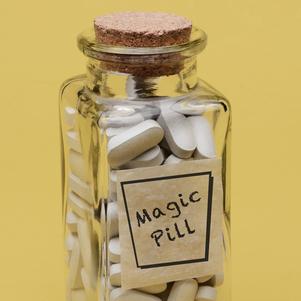A lot of alternative medicine sounds reasonable enough.
It is easy to see why so many people believe in traditional herbal remedies, for instance. Because they have been used for hundreds or thousands of years, people assume the traditions must be rooted in some sort of truth. Besides, scientists have isolated a lot of therapeutically useful compounds from nature, like caffeine and quinine, so it's not far-fetched to believe that all herbs have some sort of medicinal use (even if most don't).
Homeopathy, on the other hand, is just plain nuts. It completely defies logic how anyone with a halfway functional brain could buy into this. This type of alternative medicine is predicated upon three completely insane ideas.
Homeopathy's Three Insane Principles
The first can be derived from the word homeopathy1 itself, which roughly translates to "similar suffering." Homeopaths believe that whatever is ailing you can be cured with a toxin that produces similar symptoms. Does your skin itch? A homeopath might suggest that poison ivy could help cure you. Why? Because poison ivy also makes your skin itch. This bizarre belief is known as "like cures like."
The second crazy idea is that, in order to work properly, extremely dilute solutions of the toxin must be prepared. Continuing with the poison ivy example, a homeopath might take an extract of poison ivy and dilute it one million times. Chemistry (or common sense) demonstrates that, by the time a solution has been diluted that much, there is very little (if any) of the original substance left. And it gets crazier. Homeopaths believe that the strongest solutions are the most dilute. So, if your itch is particularly bad, a homeopath would recommend a one-billionth or one-trillionth dilution rather than a one-millionth.
The third screwy principle is that water molecules can remember things. The dilutions work, homeopaths say, because the water remembers whatever toxin was present in it.
Homeopathy Awareness
Thankfully, regulators are taking notice. The Federal Trade Commission (FTC) has warned manufacturers of homeopathic remedies to back up their claims with science or apply a label that says homeopathy is a load of garbage2.
As it so happens, it is currently Homeopathy Awareness Week. As former naturopath Britt Marie Hermes tweeted, be aware it is a dangerous health scam3.
Notes
(1) Gus Portokalos would be happy to know that the word homeopathy really is derived from Greek.
(2) The FDA isn't involved because homeopathic remedies are basically tiny vials of water.
(3) For an amusing take on homeopathy, see the video at the top of the page and Dr. Josh Bloom's article.




